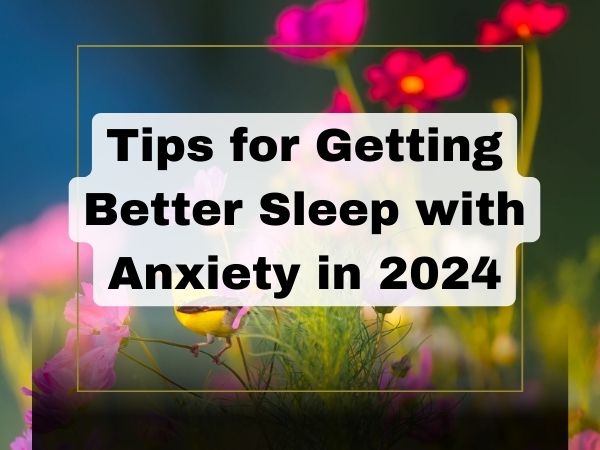Introduction
Having anxiety can make it challenging to get a good night’s sleep. Racing thoughts, worries, and physical symptoms can keep you tossing and turning, leading to a restless night. In this blog post, we will explore the common struggles of sleep and anxiety and offer effective sleep strategies for anxiety sufferers. Additionally, we will delve into the physiological link between anxiety and sleep disruption, discuss the vicious cycle of worry, insomnia, and heightened anxiety, and mention common sleep disorders associated with anxiety.
Common Struggles of Sleep and Anxiety
When anxiety takes hold, falling asleep becomes a battle. The mind becomes filled with worries and restlessness takes over. Sleep disorders, such as insomnia and restless leg syndrome, are commonly experienced by those with anxiety. Insomnia, difficulty falling asleep or staying asleep, can exacerbate anxiety symptoms. Restless leg syndrome, an uncontrollable urge to move the legs, can disrupt sleep and cause additional stress. These struggles can have a significant impact on one’s overall well-being.
Effective Sleep Strategies for Anxiety Sufferers
Pre-Sleep Routine
Establishing a consistent sleep schedule is crucial for anxiety sufferers. Going to bed and waking up at the same time every day, even on weekends, helps regulate your body’s internal clock. This routine trains your brain to associate those set times with sleep, making it easier to fall asleep and wake up refreshed.
Creating a relaxing bedtime routine at least one hour before sleep can help calm your mind and prepare you for a restful slumber. Consider activities like taking a warm bath, reading a book, or engaging in gentle stretching. These activities signal to your body that it’s time to wind down and relax.
To create a calming sleep environment, dim the lights and ensure your bedroom is cool, quiet, and comfortable. Utilizing blackout curtains, earplugs, or a white noise machine can help block out any external disturbances.
Avoid stimulating activities before bed, such as watching TV or scrolling through social media. The blue light emitted by electronic devices can interfere with your sleep hormone production, making it harder to fall asleep.
Calming Your Mind
Practicing relaxation techniques before bed can help alleviate anxiety and promote better sleep. Deep breathing exercises, progressive muscle relaxation, and meditation are all effective methods to calm your mind and prepare for sleep. These techniques help shift your focus away from anxious thoughts and invite a sense of calmness.
Writing down your worries in a journal before bed can be a helpful way to clear your mind. By acknowledging and documenting your concerns, you create a space to let go of them temporarily. This practice can ease anxiety and make it easier to fall asleep.
Listening to calming music or nature sounds can also help relax your mind and drown out any intrusive thoughts. Experiment with different sounds and find what resonates with you and promotes relaxation.
Consider visualizing peaceful imagery before bed. Close your eyes and imagine yourself in a serene environment, like a peaceful beach or a lush forest. Visualization exercises can transport your mind to a tranquil state, making it easier to let go of anxiety and induce sleep.
Sleep Hygiene Habits
Maintaining good sleep hygiene is crucial for anxiety sufferers. Regular exercise is beneficial for overall well-being, but vigorous workouts close to bedtime can make it difficult to settle down. Aim to exercise earlier in the day to ensure your body has time to wind down before sleep.
Limiting caffeine and alcohol intake, especially in the afternoon and evening, helps prevent sleep disturbances. These substances can interfere with your sleep patterns and contribute to anxiety symptoms.
Avoiding large meals close to bedtime can alleviate discomfort and prevent indigestion that may disrupt your sleep. Opt for lighter, easily digestible snacks if you feel hungry before bed.
Create a sleep-friendly environment in your bedroom. Ensure the room is dark, quiet, and cool. Investing in blackout curtains, earplugs, or a white noise machine can help block out any external stimuli that may disturb your sleep.
Addressing Specific Anxiety Triggers
If specific worries keep you awake at night, it’s essential to address them head-on before bed. Taking the time to identify and confront your concerns can help ease anxiety and make it easier to fall asleep. Consider making a to-do list for the next day to prevent feeling overwhelmed by a multitude of tasks.
For severe anxiety that significantly affects your daily life, it may be beneficial to seek the help of a therapist. Professional guidance can provide you with the tools and techniques to manage anxiety more effectively and improve your sleep patterns.
Bonus Tips
In addition to the strategies mentioned above, here are a few bonus tips that can further enhance your sleep with anxiety:
- Light Therapy: Using a light therapy box in the morning can help regulate your sleep-wake cycle. By exposing yourself to bright light, you can promote alertness during the day and better sleep at night.
- Cognitive Behavioral Therapy (CBT): CBT has been proven effective in managing anxiety and improving sleep patterns. This therapy focuses on identifying and challenging negative thought patterns, helping you reframe anxious thoughts and sleep more soundly.
- Natural Sleep Aids: Consult with a doctor about natural sleep aids like melatonin or valerian root. These supplements can help regulate sleep and are often considered safe for short-term use.
By implementing these tips and strategies, you can take proactive steps towards getting better sleep with anxiety. Remember, finding what works for you may involve some trial and error. Be patient with yourself and prioritize self-care to achieve the restful sleep you deserve.
“Getting a good night’s sleep with anxiety is possible, and with these practical tips, you can improve the quality of your sleep and wake up feeling more refreshed. Take control of your sleep, and remember, you’ve got this!”
You May Also Like
Everything About Treatment-Resistant Schizophrenia – Click Here
Demystifying Obsessive-Compulsive Disorder in 2024
